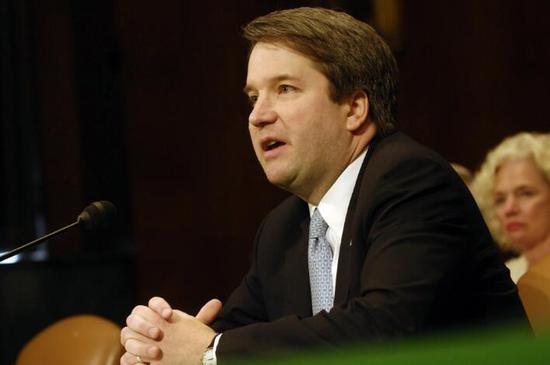12
OctoberOn the night of October 6, 2018, Brett Kavanaugh, who was publicly accused of sexual misconduct by three women, was sworn in as the Supreme Court Justice of the United States and became the ninth person in the institution which aims at so-called “defensing of constitutional dignity”.

During the three months since the nomination on July 9, a large amount of unknown allegations against Kavanaugh quickly swept the front pages of the major media in the United States. In particular, in the past two weeks, the public hearings on both sides were held about his ethical charges. However, Kavanaugh, as a nominee of the Supreme Court Justice, publicly defended himself on television and even in the media. And Donald Trump, who decided the nomination of candidates, repeatedly endorsed his nominee through social media...
None of these episodes are common in American judicial history, which shows the super-high attention among the public and proves that the issue itself is highly controversial.
At present, although Kavanaugh finally managed to become the 114th Supreme Court Justice of the United States, this may be just the beginning point for him.
The Senate’s vote to determine the final position of Kavanaugh is 50 votes to 48. The votes divided almost by the two parties is not only one of the lowest passing performances the Senate could imagine, but also the most polarized ones in confirming the candidate for the Federal Supreme Court Justice since 1881.
In other words, the two parties’ politicians have not judged Kavanaugh based on his personal competence, instead, they made their choices under the pressure of partisanship. Correspondingly, afterwards, Kavanaugh would not hesitate to behave with clear political preference, which may completely reverse the current balance in the Federal Supreme Court to a conservative tendency in line with the Republican aesthetics.
In this sense, Kavanaugh’s risky inauguration may not actually be Trump’s victory, instead, it is exactly the signal of cooperation between Trump and the GOP Establishment. The final support of Republicans in Congress for Kavanaugh is clearly driven by the traditional Republican concepts, rather than the pressure of so-called “Trumpization” of the GOP.
Despite the fact that the Republican Party’s population in the Senate is relatively small, it’s sufficient enough to make Kavanaugh destined for the appointment from the outset. However, the controversy surrounding his personal morality in the approval process cannot be neglected.
Although the authenticity of Dr. Christine Blasey Ford’s public accusation is still unestablished, and the other two women’s allegations have yet not been learned by more people, in the face of protests throughout the United States, the ethical dispute about Kavanough has gradually surpassed the fact itself and risen to the key tipping point for the intensification of American political “identification”.
According to Fukuyama, an American political scientist, with the rapid development of economic globalization and high technology, more groups in American society have been deeply trapped in the so-called feeling of “being neglected” and even the resentment of “being marginalized”. It is why Trump succeeded in attracting the middle and lower class of whites among blue-collar groups. Similarly, in the recent months, more and more women’s opposition to Kavanaugh’s nomination is again a manifestation of “group identification” in another dimension.
Kavanaugh has become highly symbolized, in the sense of both partisan polarization and group identification. On the one hand, Democrats want to curb the conservative trend of the Federal Supreme Court, so Kavanaugh would be a key breakthrough. On the other hand, women groups, who is commiitted to fighting for their rights, would regard topple Kavanaugh as a significant achievement.
Therefore, before the inauguration, Kavano received an “invitation” from Democrats in the House of Representatives. They publicly declared that if they could get a majority in the 2018 midterm election, they would put forward a comprehensive investigation into the allegations of sexual assault against Kavanaugh in the next Congress and possibly initiate impeachment. In this sense, Kavanaugh has become a late-coming but well-functioning party mobilization issue in the mid-2018 election.
Accordingly, no matter whether there is a stain of sexual infestation on Kavanaugh’s reputation, for a long time in the future, he will have to defend himself in the strife of partisanship and groups seeking identification.
When it comes to the ruling legacy of the former President of the United States, what would always be mentioned is the Justice, who was chosen by the President and still sits in the Supreme Court of the United States. For Donald Trump, it is better to say that he is fueling the current political chaos in the United States, rather than leave Kavanaugh as a political legacy after he leaves the White House.
(The author is a research fellow at National Academy of Development and Strategy of Renmin University of China and also associate professor at the School of International Studies of RUC.)